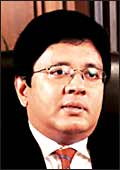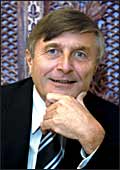|
HEADLINER
Mr TaxSmart
CALL IT prescience?
What else can explain the fact that investors pumped in huge amounts
of money into a fund, only to have it declare a dividend a few
months later? In May 2005, for instance, ING Vysya Equity Fund
(Dividend) had Rs 2.52 crore under management; the next month,
it had Rs 85.56 crore. On September 15, 2005, the fund declared
a dividend of 65 per cent (Rs 6.5 a unit). A fund manager from
a domestic mutual fund says that such instances are typically
caused by companies keen to book losses (once a fund declares
a dividend its NAV falls; in the above example, for instance,
the NAV fell to Rs 11.23 after the record date of September 15).
The manager further adds that companies somehow seem to know which
funds will declare dividends, three or four months down the line
(according to India's tax laws, a company can book losses if it
enters a fund 90 days before it declares a dividend). Instances
of similar prescience abound. The corpus of Principal Balanced
Fund (Dividend), from Rs 32.94 crore in July to Rs 152.44 crore
in August (Dividend of 30 per cent declared on November 9, 2005);
that of Birla Balance Fund (Dividend) from Rs 134.11 crore in
September to Rs 222.84 crore in October (a dividend is due anytime
now, surely)
-Mahesh Nayak
Multiple Ownership
 |
| SAB's Parker: Gin and beer it? |
One fall-out of the UB acquisition of Shaw
Wallace's spirits business was the dispute over the ownership
of some of the acquired brands. After all, Shaw Wallace's brewery
business had been acquired by SAB Miller Breweries in 2003. And
Royal Challenge and Haywards are both brands of beer and brands
of spirits. Now, says Andre Parker, Managing Director, SAB Miller,
UB and his company have arrived at a solution. "We will continue
to hold the rights to the brands in the beer business, but they
will hold the rights to the brand in the spirits business," he
says. "These rights are for perpetuity and there is no monetary
compensation involved either way."
-Kushan Mitra
Who's Better?
 |
| A DC ad: New kid on the block |
The hold music when you call The Hindu is
a dignified instrumental; at the Deccan Chronicle, it is a brassy
Tamil jingle. As they slug it out in Chennai, nothing typifies
the two dailies better than this. DC is the brash new kid in town
and in the eight months since its launch, claims to have garnered
a circulation of 2.75 lakh on weekdays. The Hindu, itself with
a Chennai circulation of 2.64 lakh, (2,64,411) is openly sceptical:
"I do not accept Deccan Chronicle's claims," says N. Murali, Jt
Managing Director. "DC Chennai, which is not a member of the Audit
Bureau of Circulation, can make such fanciful claims." Ravi Reddy,
Managing Director, DC, insists that his paper will figure in ABC's
July-December survey. With a fairly large pool of English-reading
public, Chennai probably has place for more than one daily. It
will get this once The Times of India launches its edition sometime
next year. "It will be a new ball game then," admits Murali.
-Vaishna Roy
Fill It, Forget It...
Templeton comes out with a new fund.
 |
| Franklin's Subramanian: Bottoms-up |
Small-caps-read
penny stocks-may have deservingly received plenty of flak in the
recent past, but that doesn't mean that all such scrips are of
dubious pedigree. Why else would Franklin Templeton Mutual Fund
launch a close-ended scheme-called Franklin India Smaller Companies
Fund (FISCF), with the objective of investing in small and mid-cap
companies. The mutual fund has also set a clause that it can invest
up to 10 per cent of its total corpus in non-listed companies.
Says K.N. Siva Subramanian, Senior Vice President & Portfolio
Manager, Franklin Templeton: "In a growing economy, smaller
companies benefit from the structural economic shift. Therefore,
we have filed in our offer-document that we will be investing
a part in non-listed companies to reap the complete advantage
of potential growth."
Typically, many of such small-caps would
have private equity investors looking for an exit route. A classic
example is UTV Communication where CDPQ of Canada offloaded its
stake when the company went public. Similarly Punj Lloyd plans
to mobilise over Rs 500 crore from the capital market through
an initial public offering (IPO). Standard Chartered, New York
Life, Merlion Fund and Dunearn Investments, an affiliate of Temasek,
hold stakes in the company.
Being a five-year closed-ended fund will
give the fund manager the flexibility to make his bet on particular
stocks without worrying about redemption in the fund. "The
investing approach will be bottom-up and investment would be in
stocks that are not flavour of the market, but that are strategically
placed to take the advantage of the robust economic growth in
India and the global outsourcing trend," explains Siva Subramanian.
-Mahesh Nayak
NEWSMAKERS
The Dotcom Beneficiary
 |
| Satyam's Ramalinga Raju: 23-plus
times better |
Any CEO who manages
to earn $117 million (Rs 527 crore at today's exchange rates,
and this is the total consideration that has been received to
date) on an original investment of $5 million (Rs 23 crore at
today's exchange rates) is either very smart, or very lucky, or
a mixture of both. Satyam Computer Services' Chairman B. Ramalinga
Raju, who did just that on his company's investment in Sify, is
the last. Some newspapers have compared this amount, which includes
the $62.6 million (Rs 282 crore) paid by Infinity Capital Ventures
for Satyam's 31.6 per cent stake in Sify recently, to the Rs 499
crore Sify paid for Rajesh Jain's IndiaWorld family of dotcoms;
then, that acquisition was made by the NASDAQ-listed Sify (not
by Raju or Satyam), and involved no cash outgo from his side.
Sify isn't really a dotcom. It is an internet service provider
and seller of bandwidth and much of its revenues comes from corporate
customers to whom it provides such services. However, it has consistently
been treated as a dotcom, and its acquisition, by Infinity Capital
Ventures (a company controlled by Raju Vegesna, a Silicon Valley
name who made his money when Broadcom acquired ServerWorks which
he had founded for $1.8 billion or Rs 8,100 crore in 2001) could
well signal a resurgence of interest in the dotcom space in India.
Sify is yet to register net profits; it lost around Rs 30 crore
on revenues of Rs 361 crore for the year ended March 31, 2005.
Vegesna, who is investing a further $37 million (Rs 167 crore)
in Sify, is confident that this will change. Well, surf's up and
all that, but Raju is back (with a fatter wallet) on terra firma.
NUMBERS
OF NOTE
30: The number of Indian
firms listed among top 2,000 firms worldwide in the Forbes Global
2,000 list of corporate titans
450,000: The
number of Indian students who enrolled in engineering colleges
this year, up from 250,000 last year
$100 million
(Rs 450 crore): The amount of business Indian BPO outfits
are expected to lose over the next one year because of poor data
protection
46%: Managerial
positions held by Indians in private sector establishments in
Dubai, according to a study conducted by the Dubai municipality
200: The number
of pilots Indian Airlines, Air India and major private airlines
like Sahara and Jet have lost to new discount carriers in the
past one year
28 million:
The number of households in the United States which has no savings
for retirement, according to the Prudential's US arm, Jackson
National Life (JNL)
207.2 million:
The total number of households in urban and rural India
 74%:
India's software piracy rate in 2004, with losses amounting to
$519 million (2,336 crore). This compares with 73% ($367 million
or 1,652 crore) in 2003. Software piracy rates in Asia Pacific
range from a high of 92% in Vietnam to a low of 23% in New Zealand,
according to BSA (Business Software Alliance)-IDC 74%:
India's software piracy rate in 2004, with losses amounting to
$519 million (2,336 crore). This compares with 73% ($367 million
or 1,652 crore) in 2003. Software piracy rates in Asia Pacific
range from a high of 92% in Vietnam to a low of 23% in New Zealand,
according to BSA (Business Software Alliance)-IDC
$10 billion
(Rs 45,000 crore): Expected losses by US airlines this year,
according to industry estimates, as they struggle with high fuel
prices and competition from low-cost rivals
$100 billion
(Rs 4,50,000 crore): World Bank estimates for China's trade
surplus this year as against $33 billion in 2004
25 million:
The estimated number of ringtones downloaded every month by
customers across India
Peter
Drucker 1909-2005
 |
The
purpose of any organisation," Peter Drucker once wrote, "is
to make ordinary people achieve extraordinary things." "There
is only one valid definition of business purpose: to create a
customer," he wrote another time. The two definitions, pithy,
insightful, and delightfully lacking in the kind of jargon today's
management gurus revel in are quintessentially Drucker (they are
culled from the over three dozen books he wrote). The man himself,
renowned as much for his bluntness-he described Wall Street brokers
as "a totally non-productive crowd which is out for a lot
of easy money"-wouldn't have described himself as a management
guru. He was an economic philosopher, albeit one who pioneered
the concept of decentralisation after studying the operations
of General Motors in the 1940s, and coined the terms knowledge
worker and management by objectives. And true to that description
(economists, as a species tend to be a whole lot more cynical
than management-types), the second, and concluding half of the
quote that opens this piece reads... "In reality, most organisations
allow even extraordinary people to achieve only ordinary things."
Management has lost its voice of reason.
NOTED
Recognised: Aaj
Tak, part of the India Today Group that publishes Business Today,
as the best news channel and India Today Editor Prabhu Chawla
as the best anchor in the talk show category at the Hero Honda
Indian Television Academy Awards held in Mumbai. This is the fifth
consecutive year that Aaj Tak wins this award.
Refused: By ONGC,
a request from the government to declare a special dividend as
part of an exercise aimed at shoring up its revenues. The company
was responding to a request from the Petroleum Ministry which
was acting on the basis of a communication from the Finance Ministry.
Acquired: By
State Bank of India, PT Bank IndoMonex, an Indonesian Bank as,
part of its efforts to go global. This is SBI's third overseas
acquisition this year after Indian Ocean International Bank in
Mauritius and Giro Commercial Bank in Kenya.
Ranked: Italy, as the #1 country brand
in an exercise by FutureBrand and Weber Shandwick. The ranking
was based on a survey of business travellers, consumers, convention
planners. Government agencies and officials, travel industry execs
and analysts. Australia came in at #2 and the USA at #3. India
was not part of the main listing but finds a honourable mention
at #4 (after China, UAE and Cuba) in the Rising Star category
and #6 (after Italy, Egypt, Greece, Turkey and China) in the History
category.
 Sold:
By Dayalu Ammal, wife of DMK chief M. Karunanidhi, the 20 per
cent stake she holds in the company that controls the Maran (the
late Murasoli Maran, formerly India's Commerce Minister, is Karunanidhi's
nephew; Kalanidhi Maran, seen here, Union IT and telecom Minister
Dayanidhi Maran's elder brother, manages the business) media empire,
spanning several media vehicles including Sun TV and Tamil magazine
Kungumam for an undisclosed amount to the Maran family. Sold:
By Dayalu Ammal, wife of DMK chief M. Karunanidhi, the 20 per
cent stake she holds in the company that controls the Maran (the
late Murasoli Maran, formerly India's Commerce Minister, is Karunanidhi's
nephew; Kalanidhi Maran, seen here, Union IT and telecom Minister
Dayanidhi Maran's elder brother, manages the business) media empire,
spanning several media vehicles including Sun TV and Tamil magazine
Kungumam for an undisclosed amount to the Maran family.
ARM'S
REACH OF DESIRE
 |
| ARM's Robin Saxby: B'lore
calling |
If Sir Robin Saxby,
the chairman of the Cambridge (UK)-based ARM, a chip-design firm,
is in Bangalore, blame it on the fact that the Indian market is
becoming very important for the firm. So much so that not just
Saxby, but ARM's entire board is here to get a first-hand look
(ARM also has an R&D centre in the city). Already, ARM-designed
chips are embedded in two-thirds of the mobile phones sold in
the world (ah, there's the India connection). "India isn't
just a low-cost software destination," says Saxby. "It
is one of our fastest-growing markets."
-Rahul Sachitanand
|









 74%:
74%:
 Sold:
Sold: